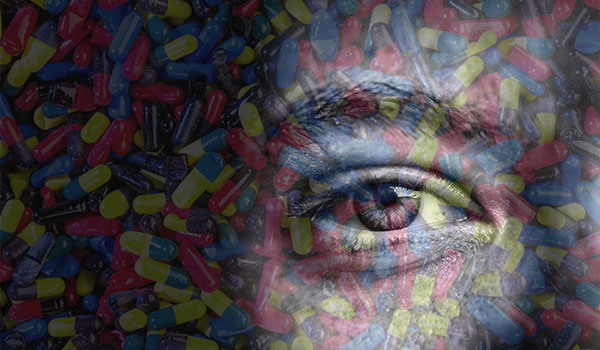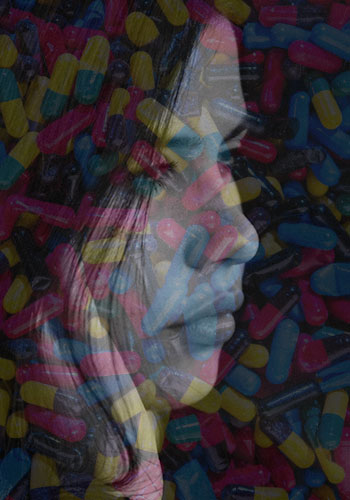Subtotal: $
Checkout
It was the end of one of my favorite rotations in medical school: obstetrics. I’d just spent a month following several high-risk patients through the University of Maryland program in Baltimore, culminating in a presentation to the faculty and other residents. The topic I chose was mental illness in pregnancy: what were the best practices for diagnosing and treating those patients of ours – and there were many – who suffered from depression? After my talk, a senior faculty member with long experience working in inner-city Baltimore had a question:
“If we look at all the poverty and trauma our patients here in the city experience … isn’t depression an appropriate reaction to their lives?”
Evidence, I answered quickly, showed that cognitive-behavioral therapy and medication work equally well for those in different socioeconomic classes. But there was far more to say on the subject than I could address in five minutes of questions and answers. And since that conversation, I’ve learned far more, and not just as a practitioner.

Let’s begin here: while depression or schizophrenia can affect anyone regardless of how much money or privilege he or she has, it is true that poverty increases the risk of mental illness. Simultaneously, those with severe mental illnesses are more likely to fall into poverty; it’s hard to pay the bills when the basic activities of life are more difficult to perform.
Worse, if you are poor and mentally ill in America, it can be difficult to get treatment. Whether the problem is related to lack of insurance or lack of providers (e.g., in rural areas), millions of people can’t access medications or professional counseling. This problem is far worse globally, where people with severe mental illnesses are often imprisoned (if they aren’t abandoned) by their families.
My listener’s question, though, was about Baltimore, a city where many poor people can get coverage through Medicaid. It’s also well supplied with psychiatrists and counselors who take Medicaid. I have cared for many of these patients in my short career, and while many are certainly better off than they would be without psychiatric care, they are often still miserable. Many can (and do) access care. But they often need far more than just pills and counseling.
Two Dangerous Views
To understand the difficulties of poor people in Baltimore who struggle with mental illness, we have first to look at humans in general. To think the mental health struggles of the poor are foreign to the relatively well-off is to deny that we are all creatures of the same kind, that we can share the same weakness and strength of the flesh and the spirit.
There are two dangerous approaches one can take to the relationship between psychiatric medication and other treatments for emotional and mental disorders, such as counseling. The first one is the popular “scientific” conception of mental illness, which calls any problem “a chemical imbalance” and assumes there is a pill to solve it. For common disorders like depression and anxiety, researchers have found some neurochemical factors that play a role, but the relationships are difficult to ascertain and the best drugs only work about a third of the time. Counseling is often as effective as medication, but the two together work slightly better than either one separately. If there are any chemical imbalances at play, they’ll probably respond to more than just medication.
The other dangerous approach is more familiar to certain kinds of Christians. This view argues that because all mental illness is spiritual, it is weakness, faithlessness, or even sin to use psychiatric medication. In this view, people who continue to experience depression, anxiety, mania, hallucinations, or suicidal thoughts are simply not diligent or faithful enough. It’s a view that creates shame, keeping people from being honest with themselves or others about the ways they are struggling.
I have often wished that I could just scribble “one hobby, take with friends” on my prescription pad.
The “scientific” approach is more effective when it comes to severe mental illnesses (SMI) such as bipolar disorder and schizophrenia. Still, this approach becomes an error if one takes it as the complete explanation of what is wrong, and if one approaches treatment from a purely biochemical perspective: the vast majority of patients with SMI need medication of some sort, but the patient with SMI who will benefit from medication alone is extremely rare. A comprehensive care plan involving work, family, and community supports is almost always necessary. I have often wished that I could just scribble “one job, forty hours per week, with a decent wage” or “one hobby, take with friends” on my prescription pad, and I have yet to meet an unemployed patient who benefited more from a pill than from a steady job. I have also met patients taking four or five psychoactive medications and have thought that no amount of serotonin or dopamine will be sufficient to compensate for lousy parents.
For some cases, yes, medication is absolutely necessary and it will have a drastic impact on someone’s life. (The more severe the symptoms, the more likely medication will be effective.) In other cases, the bad feelings may be the result of a person’s bad choices and lack of self-care. Often, though, medication simply isn’t that powerful one way or another – it is neither sufficient by itself to help someone who is suffering, nor is it enough to obviate the work of the Holy Spirit.
Medicine as a Spiritual Discipline
Mental and emotional unwellness are only a subset of sickness in general, of course, and to understand how to address them it’s important to understand what it means for a person to be sick.
One of the key insights Christians bring to medicine is the understanding that we are both spiritual and physical creatures. Throughout our lives, our bodies and our souls will constantly be affecting (and be affected by) each other. Thus, diabetes and depression are caused by factors we can control and by genes inside us that we can’t; they have effects we can measure in the bloodstream and consequences for which we may not even be able to find the words. Sometimes depression may be caused by an illness like thyroid disease, but these cases are rare compared to the number of people whose depression has ambiguously physical, spiritual, and emotional causes. And for an illness that is both physical and spiritual, the cure must be so too.
What difference does this understanding make to the way we live? Well, much of what those who are suffering from illness, physical or mental, can do to heal themselves is to live out the practices we should all be living anyway. Much of the advice I give to my patients is equally applicable if they are sick or healthy: Eat good food. Don’t abuse substances. Exercise regularly. Stay connected in healthy relationships to people who love you. Work at whatever God has given you to do. Go to church, or at least maintain some connection with a community outside of yourself. Pray without ceasing. Someone who’s not doing these things will generally get sick or stay that way.
Medication is not a replacement for prayer or counseling – it’s an aid to pursuing them.
Sometimes, of course, sickness comes close to being simply biological: one gets strep throat, takes amoxicillin, recovers, gets on with life. But sometimes an illness makes it difficult for the person to take up healthier habits, to begin to turn things around. For example, someone who is obese may have arthritic knees from carrying too much weight around – but the pain keeps her from exercising to lose weight. Similarly, an anxious person may need to talk to others more to feel better, but can’t work up the courage to call a friend when he needs to. Whether it is a swollen joint or a worried mind, the barrier must be lowered if any semblance of health is to be achieved. A heavy-duty dose of ibuprofen or a tablet of Zoloft will not fix the problem, but it can give someone what he needs in order to begin to heal his illness. Here, medication is not a replacement for prayer, counseling, or other life-giving pursuits – it’s an aid to pursuing them.
The spiritual disciplines are one of the ways we can create and reinforce the healthy boundaries of the self that keep out evil and hold in the good: meditating on the Word of God, praying for others, and fasting are all means by which we stay in touch with the source of love, which we can then give to others. But sometimes, someone who is doing all of these things and more will still find himself crushed by the weight of his own mind while being kicked in the shins by demonic forces. For these Christians, remembering to take psychiatric medication can itself be a spiritual discipline.

This spiritual discipline is also, of course, a physical one: one attends daily to one’s need (often with the help of a timer or pillbox) with a willing submission to a routine that may not seem all that helpful in the moment. To comply with a regime of medication is a choice to create and maintain a boundary to hold back the symptoms that hinder us from loving God and others. At a place in human experience where it is impossible to distinguish between body and soul, medication acts on the body to help liberate the soul. Fasting by denying oneself food can make one less susceptible to demonic influence and help to overcome sin; at times, taking one’s medication can too.
A few psychiatric medications are like chemotherapy: necessary for continued life but with unwelcome side effects. More often they are like inhalers for asthma: necessary for a fruitful life with few side effects. Neither will lead to health if the person taking them then spends his days abusing his body in other ways: feeding an opioid addiction, say. This is what it’s like for those who take pills for mental illness and then do not pray, read, fellowship, and serve. One can take medication faithlessly or refuse it foolishly. The choice to use medication must be a part of a holistic approach to one’s spiritual needs.
Medicine in Community
There are particular ways that mental illness afflicts the inner-city poor, but there is another group of people who will undoubtedly experience the same depressing traumas and sorrows of life as the poor: people who choose to live with the poor in service to them, to attempt to bring them care and healing. Voluntary poverty may grant someone favor with God; involuntary poverty may invoke his “preferential option,” but that does not necessarily mean a person in these circumstances will acquire the disciplines that will allow him to be well with any less pain or difficulty. Without rigorous spiritual disciplines, the poor and the people who choose solidarity with the poor will soon find themselves crushed by external satanic attacks and internal besetting sins. It is possible, then, that people who choose to obey God’s calling to bring his love into the most difficult places in the world will find themselves in need of psychiatric care.
My own experience with taking medication for depression was about as uninteresting as it can get: I was overwhelmed in my first several months serving at a mission hospital in South Sudan, withdrawing more and more into myself as I began to experience persistent, ugly thoughts of suicide. People around me noticed something was wrong and sat with me, letting long silences pass as I tried to ignore my need for help. I Skyped with a counselor and eventually started taking medication. Then political realities in the country forced us home suddenly, and threw me into even more of a tailspin.
The antidepressant is not a cure. I can’t say I feel dramatically less sad or anxious, nor is the horror of what I saw in the hospital as South Sudan descended into violent chaos any easier to live with. What the medication does, though, is give me a little edge over the darkness, a slight toehold when I’m lost inside myself and trying to get out. It works in conjunction with reading my Bible, praying, fasting, exercise, fun activities, and fellowship with other believers.
We can’t distribute pills to the poor and bid them well; we must choose to share in their sufferings.
I do what I can to be well; we do what we can to help others be well. Depending on where they live, it may be possible for followers of Jesus to help increase the supply of psychiatric care by calling their political representatives. We can also encourage and support professionals serving in underserved areas, or we can choose to serve ourselves. And wherever we are, we can encourage those who need it to take advantage of available help.
Above all, we can offer our own friendship, the care of the community, and the support of the church. There are organizations to help churches do this, such as Stephen Ministries or the Christian Counseling and Education Foundation. And of course, such formal programs may not always be needed -- informal encouragement may be what works best. In either case, Christian communities must be willing to walk with people who are suffering while encouraging them in the spiritual disciplines to bolster the fight, and with the wisdom that comes from attending to Christian teaching about the nature of humans as an organic unity of body and soul.
We can’t merely distribute pills to the poor and bid them well; we must choose to share in their sufferings if we want to ameliorate the burden they bear. It is only in communities of believers that we can learn to practice the spiritual disciplines that fend off the demons outside and the despair inside. These communities must encourage their members (and even more, their leaders) to participate in healthy practices for body and mind while working to ensure that everyone is able to access professional resources such as counseling and psychiatry.
We’re strange creatures, we humans: not souls inhabiting bodies, but whole persons, blending the spiritual and physical in ways that we don’t fully understand. The help we need can come in many guises: a doctor, a friend, a scripture study, a new habit. One does not exclude the other, for the God to whom we pray has many ways to heal – pills included.
Already a subscriber? Sign in
Try 3 months of unlimited access. Start your FREE TRIAL today. Cancel anytime.







Rebekkah
Thank you.
Carolyn Lawrence
I am a Clinical Nurse Specialist in psychiatric and mental health nursing and I am first a Christian. I agree with everything Matthew has to say. God bless you for serving people who are shunned and misunderstood.
Carolee Uits
I have long awaited someone in the medical field to write such an article. It gives credence to those of us who are pastors and spiritual directors, individuals who do not have the "OFFICIAL medical perspective as we counsel and support others. This article will be circulated in my work. Thank you,
Vanessa
Wow. Thank you for shedding light on this subject.
Dr Danny Sessler
Great article Dr Loftus. Thank you!